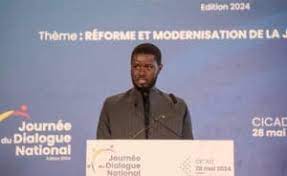APA – Dakar (Senegal) – The creation of a constitutional court and the introduction of a magistrate of freedoms are among the proposals of the national dialogue on the reform of the Senegalese judicial system.
On Tuesday 4 June, Senegal’s national dialogue on the reform and modernisation of the justice system began to produce the results of its deliberations.
After a week’s work in Diamniadio, some thirty kilometres from Dakar, the participants presented a “set of recommendations” to improve the functioning and organisation of the judicial system.
The other main reform advocated concerns the modernisation of the way in which those involved in the judicial system exist and operate.
According to the journalist Bamba Kassé, rapporteur of the subcommittee on the organisation and functioning of the judicial system and the subcommittee on the actors of the judicial system, the Assizes recommended “limiting the powers of the public prosecutor, increasing the powers of investigating magistrates, creating a magistrate for liberties and detentions and setting up a constitutional court to replace the Constitutional Council”, which played a major role in the organisation of the last presidential elections.
In addition, a “new organisation” of the High Council of the Judiciary, currently chaired by the President of the Republic, has been proposed to make it more autonomous, “with extended powers to make it an advisory and not just a consultative body”, as well as a revision of the existing codes (penal code, code of criminal procedure, code of civil procedure, family code, etc.).
Over the course of the seven days, the two sub-committees held open sessions in which, in accordance with the initial recommendations of the president, Bassirou Diomaye Faye, a wide range of panellists were present and participated in the debate. Academics, judges, lawyers, court officials, journalists, sociologists, Senegalese litigants, representatives of political parties, disabled people and even former prisoners took part in the proceedings.
“It should be noted that a broad consensus has been reached on two points. It is a question of rebuilding the judiciary and breaking with its colonial symbolism so that it reflects our own values and is more sovereign. (This point was the subject of a) very strong consensus” among the participants, Mr Kassé stressed.
“The other point on which there was a very strong consensus concerned local justice, with Maisons de la Justice, which should serve as an option for citizens in conflict and whose powers should be extended,” added the Secretary General of the Senegalese Union of Information and Communication Professionals (Synpics).
However, he noted “some points of dissonance” regarding the presence of the head of state and the Minister of Justice on the Supreme Council of the Judiciary, with some people calling for “the Council to be opened up to other bodies”. Other voices were also raised against the reform aimed at introducing shared parental authority and the implementation of the Maputo Protocol in favour of women victims of incest and rape,” he said.
President Bassirou Diomaye Faye, who was elected on 24 March, has embarked on a process of reflection to ensure a fairer justice system. He presided over the opening of the national dialogue on the reform and modernisation of the judiciary in Diamniadio on Tuesday 28 May.
Although the judiciary has been heavily criticised in recent years, he was keen to make it clear that this meeting was not an “inquisition” to find one or more culprits to condemn. “It is more a question of holding a clear, calm and peaceful debate to examine our judicial system, identify its strengths and weaknesses and work together to find solutions to overhaul its operation and improve its performance,” said the 44 year-old president, who spent almost a year in prison under his predecessor Macky Sall for publishing a Facebook post criticising the behaviour of certain magistrates.
ODL/ac/lb/as/APA


